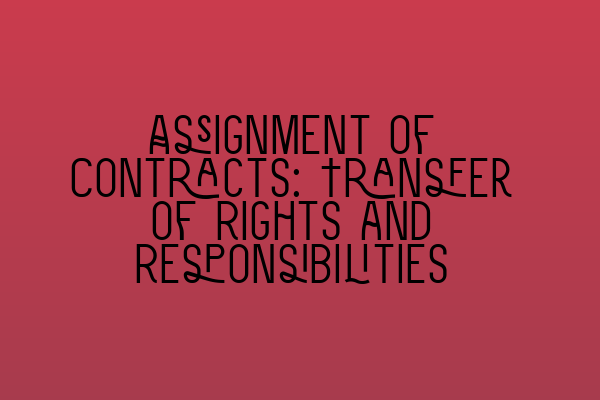Assignment of Contracts: Transfer of Rights and Responsibilities
As a solicitor specializing in contract law, I often come across situations where clients need to transfer their contractual rights and responsibilities to third parties. This legal process, known as the assignment of contracts, can have significant implications for all parties involved. In this blog post, I will provide an in-depth exploration of the assignment of contracts, including its definition, legal requirements, and key considerations. So let’s dive in!
What is the Assignment of Contracts?
The assignment of contracts refers to the transfer of contractual rights and obligations from one party, known as the assignor, to another party, known as the assignee. It allows the assignor to transfer their rights and benefits under the contract to a third party, who can then step into the assignor’s shoes and fulfill their obligations. Essentially, it is a method through which contractual relationships are transferred from one party to another.
Legal Requirements for Assignment
To ensure the assignment is legally valid and enforceable, certain requirements must be met:
1. Consent: The contract must permit assignment, either explicitly or implicitly. While most contracts allow assignment unless expressly prohibited, some contracts may restrict assignment. It is crucial to review the contract terms and seek legal advice if in doubt.
2. Formalities: Some contracts require specific formalities for proper assignment, such as written notice to all parties. The failure to comply with these formalities may render the assignment ineffective. It is essential to adhere to any prescribed procedures outlined in the contract.
3. Financial Considerations: The assignor might need to obtain consent from the counterparty or pay a fee for the assignment. It is crucial to review the financial implications and obligations associated with the assignment before proceeding.
Key Considerations before Assigning a Contract
Before assigning a contract, it is essential to consider the following factors:
1. Liabilities: The assignor remains liable for the obligations under the contract unless the contract specifies otherwise. Therefore, it is vital to assess the potential risks and liabilities associated with the contract before assigning it.
2. Consent of Counterparty: Some contracts require the consent of the counterparty before assignment. It is crucial to establish whether the counterparty’s consent is necessary to avoid any potential dispute or breach of contract.
3. Assignee’s Capabilities: Before assigning a contract, it is crucial to evaluate the capabilities and resources of the assignee. Ensuring that the assignee has the necessary expertise and capacity to fulfill the contractual obligations is essential for a successful assignment.
4. Contractual Termination: Assigning a contract may not always be the best solution. Sometimes, terminating the existing contract and entering into a new agreement with the intended third party may be a more suitable option. It is important to assess the circumstances and seek legal advice to determine the most appropriate course of action.
5. Legal Advice: Assigning contracts can be complex, and it is advisable to seek legal advice to navigate through the process. Consulting with an experienced solicitor specializing in contract law will ensure the assignment is properly executed and legally binding.
Conclusion
In conclusion, the assignment of contracts plays a significant role in the transfer of rights and responsibilities between parties. However, it is essential to comply with legal requirements, consider key factors, and seek professional advice to ensure a smooth and legally valid assignment process. Whether you are an assignor or an assignee, understanding the intricacies of contract assignment is crucial for protecting your interests and ensuring compliance with the law.
If you found this article helpful, you may also be interested in reading:
– Unveiling Real-Life Case Studies: Insights into Legal Practice and Decision-Making
– Exploring Solicitor Salaries in the UK: Average Earnings and Factors Affecting Income
– Mastering Client Relationship Management: Skills for Solicitors to Enhance Trust and Loyalty
– Pursuing a Law School Education in the UK: Choosing the Right Path for Your Future
– Securing Training Contracts: A Roadmap to Becoming a Solicitor
Thank you for reading. Should you require any further information or legal assistance, please do not hesitate to contact SQE Contract Law.
